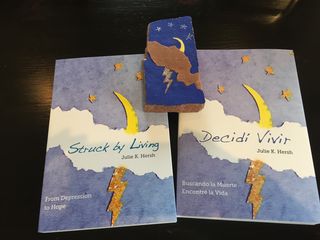Depression
Can Empathy Heal?
Chances are the person next to you can empathize and offer help.
Posted March 4, 2017

On a blue-skied day last week, I strolled the Dallas Arts District on a WalkSTEM tour. WalkSTEM ignites the imagination of elementary and middle school children through walking tours that shows math alive in the world around us. We admired the math used to create the sun-deflecting slats of the Winspear, the nature-inspired undulations that ripple the waterfall outside Hall Arts and the conical windows of the Meyerson. My brain skipped and stretched in fun albeit unfamiliar ways. Depression, absent from the landscape, never entered my mind.
Our group paused for lunch at DMA, and I met a man whose theater-geekiness matched my own. For those that don’t know me, this is a feat. I’m Board Chair for the Dallas Theater Center and always up for a play or musical. We debated the merits of “Colossal,” “Oedipus El Rey,” “The Christians” and the shell shock of “Gloria.” He’d seen every play two times or more. I felt that spontaneous human spark of a deeply shared interest.

Then the conversation shifted.
Someone outed me or I outed myself, I can’t remember. The slippery slide of the conversation is so familiar that I felt myself pressing an imaginary brake to the floor. You wrote a book. About what? Depression. You’re a doctor? No. My Own. I wanted to rewind the afternoon and restart.
Lately, a number of folks in hiding about depression have told me why it’s so much easier for me to be open than them. You don’t have a job to lose. People assume you’re smart, so they won’t think you’re nuts. What about Stigma? I twitch when I hear this word.
Often I jump on my soapbox about my theory that the constant focus on “stigma” creates a problem far larger than actually exists. Depression is everywhere, most people waiting for someone else to break the ice. Our fear of rejection looms larger than the rejection itself.
And yet, when I meet someone new who seems to like the “depressionless” me, I don’t want to talk about depression. We all know first impressions count. “I tried to kill myself” is not a great opening line. I imagined my new acquaintance reading the first line of my book and dubbing me Debbie Downer.
You may assume my new friend excused himself, shunned me or indelicately looked away at the mention of depression. He did not. He was kind, curious, wanted to read the book in Spanish and English. For all the talk of “stigma” in the world, this man treated me with respect and kindness.
Through my blogging and speaking about depression over the past seven years, this has been by far the majority response. A handful of people (mostly online) had brutal assessments that called for my death (literally, that chick was having a really bad day), or a gag order (because I did not have a “real” disease), or for being paid off for mentioning my positive experience with electroconvulsive therapy (ECT). My husband still wants to see that money.
Compared to this surly minority, thousands of people have thanked me. Profusely. There are now 10K copies of Struck by Living floating around in the world, a book I almost didn’t publish because I feared the impact on my husband and family.
The responses have been personal and unexpected. You are “just like me” has sprung from the lips of a businessman, a Goth-like teen dressed in black and with more punctures than I could count, people from New York, California, Louisiana, New Jersey, Texas, the United Kingdom, Australia, Mexico, Chile, rich, poor, physicians, gay, straight, all colors, college students, psychologists, soccer moms and celebrities. The shared experience of illness binds and heals us in a way that no medicine can reach. I have helped them, and often many of them have helped me when I have relapsed.

As Dr. Naomi Remen says: “I have served impeccably with parts of myself that embarrass me, parts of which I am ashamed. The wholeness in me serves the wholeness in others and the wholeness in life. The wholeness in you is as worthy as the wholeness in me. Service is a relationship between equals.”
Our brokenness makes us whole. This irony is etched in my bones. Yet my pride makes it hard to assume my role as the poster child for mental illness. I am more than my depression. And yet my depression has carved this vessel of the human being I am. I can’t escape it.
I dropped off the newly published version of Struck by Living and Decidí Vivir in my new friend’s mailbox later that day. I figured if he read it and rejected me, that’s life. He’s a busy guy. I doubted he’d read it anyway.
The next day I got an email:

“I decided to read a couple of chapters of your book yesterday. You probably have heard this before… I could not put it down until the end.
It is a touching story of the innate frailty of the human condition, the combined power of grace and science, the ultimate triumph of courage over despair, and a wonderful ending that is still being written. . .”
The comment was a bow to the whole me, with all my cracks and fissures. Authenticity is risky, but far less perilous than most of us believe. The upside is human connection.
What is the formula for the healing power of empathy? I don’t know the math. At the same time, I know that it’s real. I’ve seen and felt the results.
For more information about Struck by Living, Decidí Vivir or Julie K Hersh, please go to the Struck by Living website.




